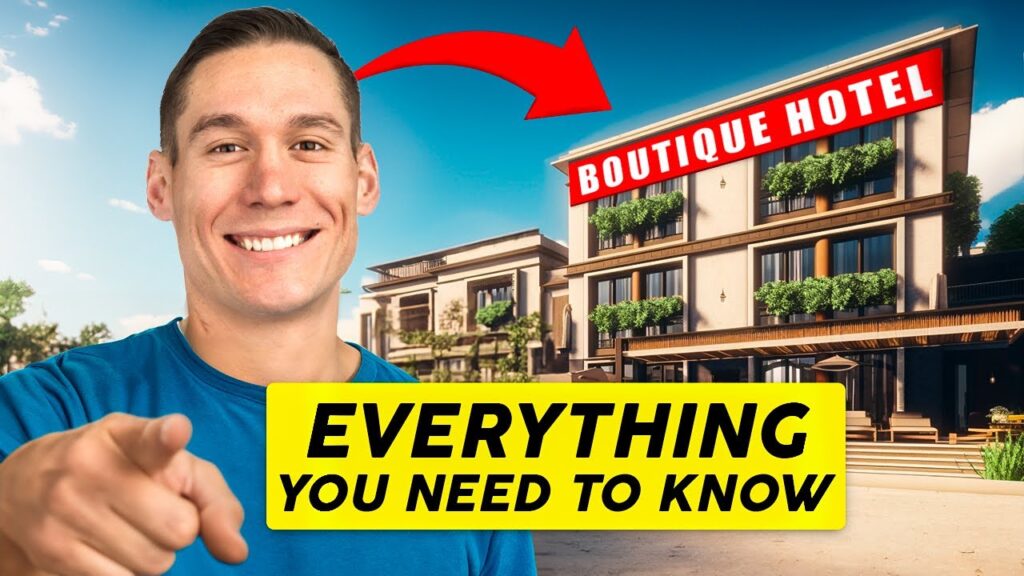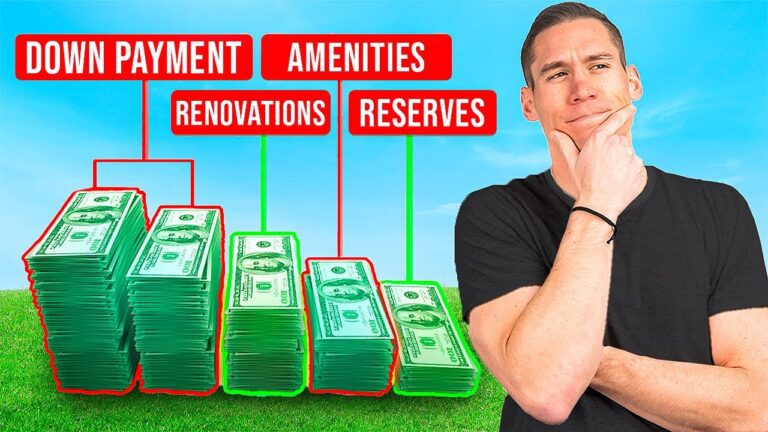I’m convinced that the boutique hotel strategy is the absolute best if you want to reach your financial freedom goals faster. It’s a business that fuels AND funds your lifestyle. If you have heard of investing in boutique hotels or commercial Airbnb properties like cabin resorts or tiny home communities and it has piqued your interest because of the size or the scale or because of how cool these kinds of properties can be, I’m going to walk you through all the areas you need to be aware of to get started investing in them.
Boutique hotels or these unique multiunit STR properties are awesome because you can get economies of scale with ONE purchase. Plus they can be super fun. You can be creative and create spaces that people love. Ultimately, it’s a way you can enhance your lifestyle quickly by skipping the phase of buying a bunch of single properties.
It’s really taking a scaled approach to short-term rentals or Airbnb investing. Normal short-term rentals can be awesome because they can get you out of your job faster, BUT they also can create a new job for you pretty quickly. You have to do everything yourself because you scale your revenue slowly and you end up working more hours and at irregular times. So, in this post, I’m going to show you how you can skip this stage, or at least how I did, and scale into larger deals with boutique hotels and put systems in place to take you OUT of the day-to-day and treat it as a business.
STRATEGY BEHIND BOUTIQUE HOTEL INVESTING
So, before you decide and jump headfirst into boutique hotel investing you should consider your long-term goal and how boutique hotels will help you get there. If you don’t know your destination, any path will get you there. I’ll share what the “perfect” boutique hotel deal looks like if there is such a thing, and you can decide for yourself.
I will say that, in my experience, the best deals are value-add deals. That means you are going to have to do some renovations and improve the operations so that you improve the income and the equity in the deal. In Commercial Real Estate, when you increase the income of the property, you increase the actual value of the property, unlike residential real estate which is based on comparable sales. I have seen very few good deals where NO renovations are needed and that already have sound operations in place. This is where your opportunity lies.
To be successful in the space, you are going to need to be a problem solver and find value-add opportunities. Now the great part is you don’t have to do everything yourself. You can obviously hire a general contractor to do the renovation work and even hire a designer to handle the design and furnishing. Most of these deals have the income to outsource these roles – which is why I LOVE them. They come with scale in place.
Ideally, your “perfect” deal looks like a mom-and-pop-owned hotel that is outdated and poorly managed, usually because the owners are tired of running it or want to retire, or they do everything themselves so the quality lacks. The ideal property isn’t on Airbnb, and they do little to no marketing, and the owner likely lives on-site in the manager’s unit.
So, you can come in and bring an updated business model that is easy to implement, which is:
- Renovating and redesigning the units
- Putting the units live on Airbnb and the other OTAs
- Converting the manager unit into a rentable unit to increase the income
- Putting systems in place and treating it like a business
And a lot of these mom-and-pop owners have owned the properties for a long time so they have little to no debt on the property, so these are PRIME properties to get seller financing and structure it as a win-win for both parties.
That’s what the “perfect” boutique hotel deal would look like and represents the overall template of what to look for when getting into the Boutique Hotel space. In this post, and the ones to come, I’ll show you how you can identify this ideal kind of property and begin to implement the strategy.
FINDING YOUR MARKET
The first thing to consider is the market and where to buy. I hear all the time, “Where should I look for boutique hotels”.
So let’s answer the first obvious question of if you should only buy a boutique hotel near you. I think if you’re a person who wants control and wants to be intimately involved in the day-to-day, then yes, buy something close to you. Or if the hotel is smaller, and you don’t have the revenue to hire a local manager and all you can afford is cleaners and handymen like with a STR house, then buy close to you because you’ll still have some work to do. You don’t quite get the economies of scale with these smaller deals, BUT the barriers to entry are lower.
My first deal was an 8-unit that opened the door and built the momentum for me to get more and bigger deals, even though that would be too small for me to buy today. But that could be a good place for you to start. And what I emphasize, and execute in my own business, is clean, effective, and efficient operations that do not take you to operate – and with that in place, you can buy anywhere.
Ultimately, you want to buy something that can be “marketable” – meaning that the property has the inherent appeal that will make it easier to market and drive guests to book with you. Those properties can work pretty much anywhere. If you create a super cool place with amenities and great design, it will be easier to market, and you’ll be able to drive traffic to your hotel.
That is the location question. The other piece of that is “What markets work for boutique hotels?” The short answer is any market that works for STRs.
But don’t overthink it. It boils down to don’t buy a in bad location. A decent location can still do well, so don’t get analysis paralysis over the market. The more important thing is to decide and then GO. If you need to, select two or three markets to start and narrow down as you go.
SOURCING/FINDING DEALS
Once you identify and pick your market, you start filling your acquisition funnel with potential deals to screen, analyze, and offer on. Think of it as a literal funnel. The top is wider and it gets narrow down at the mouth of the funnel where good deals are spit out. And the more you put in the more you get out. The more leads you get, the more deals you screen and analyze, and the more you offer, the more you will get success at the bottom of the funnel by getting under contract and closing the deal.
Here’s a list of websites you can start looking at today to see what’s available and at what prices so you can set your expectations for what you can get into a deal.
Crexi is one I use a lot to look at potential deals. It’s kind of like the MLS equivalent of commercial real estate where brokers put their listings.
And Loopnet is another one that is similar to Crexi where commercial deals are listed. If you are brand new or just starting to look, start on Crexi and Loopnet and you’ll find potential deals that you can analyze.
Other deal sources:
- One of the most important is Broker relationships. Most commercial deals trade with brokers, so by creating relationships with brokers in the areas you are looking in you can get leads on deals that don’t yet hit those online listing sites.
- Direct-to-Seller Marketing. This is where you pull a list of hotels/motels in your area with a service like Propstream or Listsource then send mail, call, or email the owner to generate your own leads.
- Networking with other investors.
All the lead sources work. Which ones you use is a matter of what you need to do to fill up the funnel and get more leads to analyze.
ANALYZING DEALS
When it comes to analyzing deals that you get into your funnel, what you are really looking for is ways to MAKE a deal by adding value. You aren’t just looking for a good deal, because most good deals get scooped up before they hit the market. You have to look for ways to make the deal work by finding deals with problems you are uniquely positioned to solve, which others might see as barriers. This could be by doing a large renovation, adding units, or adding additional streams of revenues that others don’t identify – all of which are barriers to others and opportunities for you.
This might be the most important part of the whole process because this is where you start to vet deals and test your operational assumptions and really put together the numbers of what makes a good deal.
And so you guys can get started underwriting deals, download the analysis tool that I use to underwrite ALL of my own boutique hotel deals and you can DOWNLOAD FOR FREE. Who doesn’t like free stuff?? Go snatch that and you can use it to start underwriting deals.
Now let’s talk about the data you input into the underwriting model. There are 3 ways I want to talk about, one of which you’re probably already familiar with if you already invest in short-term rentals and Airbnbs, and the other 2 make all the difference when underwriting commercial properties.
- The first one is Airdna – this one is really good for STR data because it scrubs Airbnb and VRBO and you can pull all the STR rate, occupancy, and demand data. But it is STR-specific data and boutique hotels are a hybrid of STRs and hotels, so it’s not exact.
- The second is a STR Trend Report, otherwise known as a STAR report. You can get his on STR.com but be warned, it is $660. This gives you all the hotel data you need and is a great source of data. And most banks or hospitality lenders will ask for it. But it’s all hotel data, so again not exact because your boutique hotel will function as a hybrid.
- Research comparable properties on Google and look for properties that are similar in quality, offerings, and amenities to what you plan to create. If you are going to be creating something unique that operates in this middle ground of STRs and hotels, then you need to do research on STRs and Hotels for similar properties that you can find and combine the two and build a data set that better reflects what you reasonably, and conservatively, expect to do.
And to get a good idea of how your boutique hotel will perform, you do all three. That is how you set yourself apart and identify the best deals.
To see a FULL breakdown of how to analyze a deal in much deeper detail, stay tuned for the Analysis post later in this series where we’ll go over some rules of thumb and tactics to find and identify the best deals in any market. But for now, download the spreadsheet and start messing around with it. Get on Crexi and Loopnet and start finding any deals and plug in the numbers to get familiar with underwriting these kind of deals. The more you use it the better you’ll get at recognizing a good deal when you come across it.
OPERATIONS
To underwrite your deal and be confident enough to offer once you find a good deal, you’ll also need to get a good idea of how you’ll run it. Operating a boutique hotel does vary from operating short-term rentals. Not so much in that it’s different activities but that it’s more in-depth. It’s like going from playing tennis on the Wii to playing actual tennis. With STRs your chance of failure is low. The mortgage and the expenses are lower so one bad deal likely won’t wipe you out, there’s just less money at risk. With a boutique hotel on the other hand, the mortgage and expenses are going to be a lot higher and will likely involve investors, so you really have to be on top of your operations.
One of the first operational assumptions to check is your labor costs, or how many employees (physical or virtual) you will need to run it.
As a baseline, the things that you’ll absolutely have to do are:
- Message and service guests
- Manage your rates and marketing to get rooms booked
- Administrative items
- Fix things when they break or get damaged, and
- Be available to help resolve issues when they happen – and they inevitably do.
And when you start, those are likely all going to be hats you wear. As you scale up though, you start to outsource and can begin with the admin, guest messaging, and maybe your revenue management and marketing. These are the things that don’t take an in-person employee and you can hire cheap virtually. I did exactly this when I scaled into boutique hotels and hired what I call our eConcierge, VAs from the Philippines to message all of our guests and do our guest services and admin tasks. This is the easiest and cheapest place to outsource from the beginning. For a VA in the Philippines, you can expect to pay about $4-7/hour for good service. This is where you will save most of your time.
Then with on-site issues that your eConcierge filters, you can hire property staff to send these issues to when they can’t resolve them virtually (think a disgruntled guest, someone checks into the wrong room, lockouts, or something like that). You are either this person, or you hire someone in-house to manage your hotel and they become this person.
And the cool part about boutique hotels is that you can get all of this with one purchase. The scale in this space is my favorite thing.
And to keep it simple and in line with your experience operating STRs, you can set up your property to be unstaffed, and run really lean. You don’t need a front office and front desk staff like a normal hotel. You can use the same smart locks used on your Airbnbs, I like Schlage Encode the best. Guests really like this because they want the standardization and amenities of a hotel, but don’t want to go to a front desk to check in and jump through all those extra hoops. With boutique hotels, you can provide the best of both worlds, the flexibility and appeal of STRs with the standardization and amenities of hotels.
Finding the money
Now that you’ve picked your market, know how to find deals, and how to analyze them, and have planned how to run it, you can start raising money and bringing in investors to purchase your first deal. And boutique hotels are larger properties, with higher purchase prices, so to take down a deal you’re likely going to have to bring in outside capital from investors, assuming you don’t have all the money yourself. Anytime you want to scale, in anything, capital is the limiting factor. So, let’s solve that piece of the equation.
And raising money is as much an art as it is a science. There are key things you can do like go to meetups, post on social media, and network to fill your calendar with potential investor calls. A tangible thing you can do is underwrite hotels to get familiar with them and then build a sample deal package to show potential investors what a deal would look like. This is something I did early on with deals I raised for it and built my confidence by pitching an example deal and saying I’m looking for THIS, and if I find it would you want to invest in it with me.
And always structure those conversations as presenting an opportunity, NOT asking for money. Asking for money makes you seem desperate, and nobody wants to invest with someone who is desperate. Frame yourself and the deal as the prize and tee it up as a great opportunity for them to invest passively in a high-yielding deal, potentially even being able to travel to the property and stay for free. There are also tax benefits with depreciation. There are many benefits for investors investing in boutique hotels, you just need to find out what the investor you are talking to is looking for (because they all have different needs) and then show how you and your deal can provide that for them.
And if you don’t have a big investor base yet – start getting more active. Talk to people about investing. Make posts about it. Create lead magnets on your page, which are valuable pieces of content, in this case focused on passive investing, that people can download in exchange for their email address, and build your list. With everything you do – in-person networking, social media content, whatever – it’s as simple as providing value to your intended audience. That being those interested in passively investing and then asking them to reach out to learn more about investing with you.
You can start with the people you know. Go through your contacts, talk to friends, and ask for referrals. Share what you are doing and focus on connecting with people that you can help by providing a great passive investing opportunity. That is the key to finding people to invest in your deals.
DEAL STRUCTURING
The cool thing about investing in boutique hotels is you can create two value drivers. 1) is the value of the real estate that you are improving by increasing the income. And 2) the value of the operation company itself, or the “management” company that you build to operate your deal. And THIS is the business side of it where your management company can be valued on a 3-5x multiple of your earnings. And this is the format that companies trade on and it’s super cool. When I sold my business – I sold not just the real estate or “ProCos”, but the Operating Company or the “OpCo” as well and got paid from both.
So, to maximize the value you create, you can structure your boutique hotel investment with a PropCo / OpCo structure. In simple terms, PropCo is your property company which is the entity holding the real estate. And the OpCo is your operation and management company which manages the hotels.
PRO TIP: Have a signed management agreement between your PropCo and your OpCo, and you get to benefit from both sides.
You bring investors into your PropCo and share ownership in the deal that way. And then your OpCo is all you, or you and your partners that help you operate the business. Make sense? And remember for ANY questions that come up for you, ask them in the comments below and I’ll reply to all of your guys’ comments.
Now when you’re raising money for your PropCo (the company holding the actual real estate), you have different structures you can use and there are pros and cons of each but all of them work.
The simplest way to do it would be by bringing on debt investors, essentially making it a big BRRRR, or buy rehab rent refinance repeat. I call this the BRRRRbnb strategy. This is where you bring in private investors that have a promissory note on the property and they get paid interest for lending you the money, and it’s backed by the physical asset. It’s very simple and cheap to set up. Say someone loans you $100k that is backed by the property in exchange for 10% interest. Then when you complete the project, you can refinance the property with the bank to get them their money back and go do the next deal, completing the BRRRR strategy.
The other way would be to bring in equity investors where the investors invest their money in exchange for ownership in the deal. You could do this via a partnership, joint, venture agreement, or syndication. Partnerships and joint ventures are also simple – the investors invest X amount for Y percentage of equity in the project. Then the cash flow, appreciation, and tax benefits are split according to the ownership percentages. You just need an operating agreement between you and the partners outlining who does what and who gets what in return.
The other way to do an equity raise would be via syndication where you bring in multiple investors as limited partners, or LPs. The LPs invest their money and you as the General Partner or GP run and manage the deal and you have the say in how the investment gets carried out. A typical split might be 70/30, 70% to the LPs, and 30% to the GPs with maybe a 6-8% preferred return. If that sounds complicated right now, that’s alright, we’ll dive deeper into it later in this series.
This is meant to be an overview of how you can structure and fund your deal. I’ve done all these structures and they all work, it just depends on which structure works best for your deal. If one of these ways appeals to you go do a Google search or put your question in the comment section and I’ll try to point you in the right direction – with the disclaimer I am not a real estate attorney. Talk to a professional before raising money.
Exit Strategies / Stabilization & Management
Exit strategies seem to always come up, and it’s a valid concern. Let’s talk about your options.
When you first think about it, you have two main ways to get liquidity (or your money) out of the deal once the property is stabilized – meaning you have completed the renovation and you’ve been successfully operating it at the improved level for 12 months. You can refinance to complete the BRRRRbnb and hold on for cash flow (which is normally what I do) or you can sell to capture the equity you created and go do the next deal. And I say 12 months because if you go to refinance the banks want to see 12 months of financials to know the business is proven out and can cover the debt. And if you are selling, potential buyers want to see the same thing to know the property makes money.
But another thing I love about this space, and stay with me on this, is you can also get your equity out of the deal another way. Remember the PropCo / OpCo structure we talked about and I said I sold both of mine at the same time? That is one option, but you can also sell each individually. Say you want to access the equity you created in the property but still want the cash flow from operating. Well, you can sell the real estate to a new buyer and continue operating it for them with your management company. It’s the same thing you did between your PropCo and OpCo, but just with a new PropCo that is owned by someone else. Pretty cool, huh?
And if you’re considering selling the property after it’s stabilized, I’ll share some insight on that because I’ve successfully sold 4 boutique hotels so I’ve seen the exits play out. And essentially, bigger is better. Generally, over $1M on the exit gives you a bigger buyer pool. But we’ll dig into that deeper in an upcoming post. For each section I highlighted over today, I will be releasing a full-length post on all the nuances and specifics of each section so make sure to follow along.
Summary
There is everything that goes into getting started investing in boutique hotels! And I like to think of it as a big puzzle, putting in each piece one at a time until the whole picture comes together. There’s a lot to it. But think of it this way: would you rather work harder for a shorter amount of time on one deal that will make a big difference or work for a longer amount of time and do a lot more deals to reach the same goal? Boutique hotels aren’t right for everyone. It’s for those who want to go big and be creative in the process. For those willing to put in the work, I don’t know if there’s a better strategy out there to reach your financial goals and have fun doing it.
About Blake Dailey (remove the capital at the start of each word, do normal capitalization)
I started my real estate investing career renovating hurricane damaged homes in Panama City, FL – talk about jumping in the deep end! The First House I Ever Bought Had A Separate Mother In Law Suite And I Had A Hunch That It Would Rent Better On Airbnb Than As A Long Term Rental. Instead Of Just Covering My Mortgage, That First STR Unit Cash Flowed While Allowing Me To Live For Free. That Started My Love Affair With STRs.
While Still Active Duty In The Military, I Purchased Over $20M In Real Estate And I Built My STR Portfolio To Over 80 Units, Including 5 Boutique Hotels (And Counting).
Now I Specialize In The Acquisition, Operation, And Construction Management Of Value-Add Real Hospitality Properties. I’ve Bought, Renovated, And Managed An $11M Portfolio Of Five Boutique Hotels In Multiple Markets Nationwide And Oversaw The Construction Management Of Upwards Of $2M In Renovations On Those Projects.
I Built My Previous Boutique Hotel Company To Over $3M/Year In Topline Revenue And Have Hosted Tens Of Thousands Of Guests And Received Thousands Of 5-Star Reviews, Maintaining Superhost Status During My Time Running The Company. I Sold That Company In March Of 2023 To Continue To Expand In The Hospitality Space With Larger Hotels, Resorts, And Unique Commercial Short-Term Rental Properties. And Now Want To Help You Do The Same!




